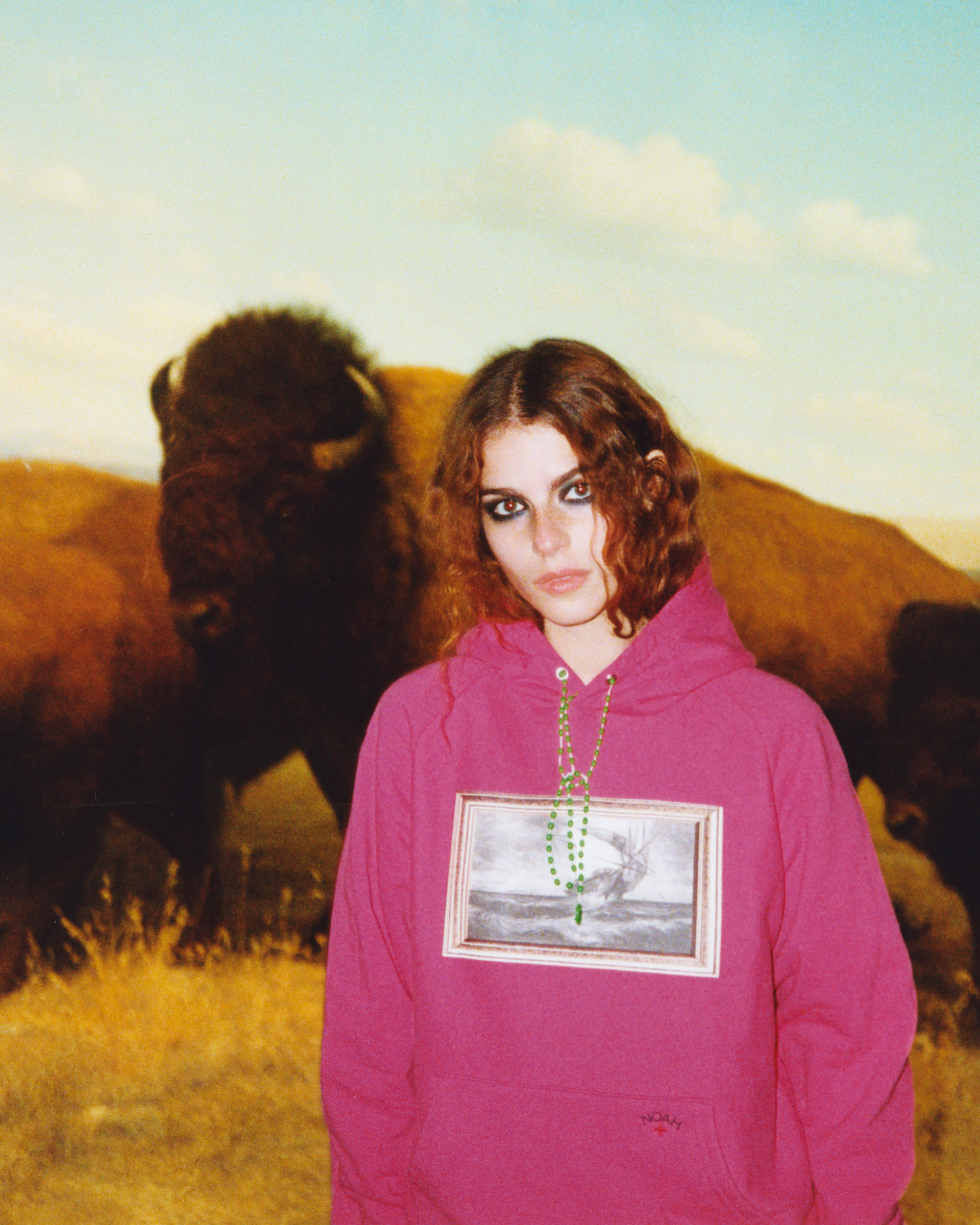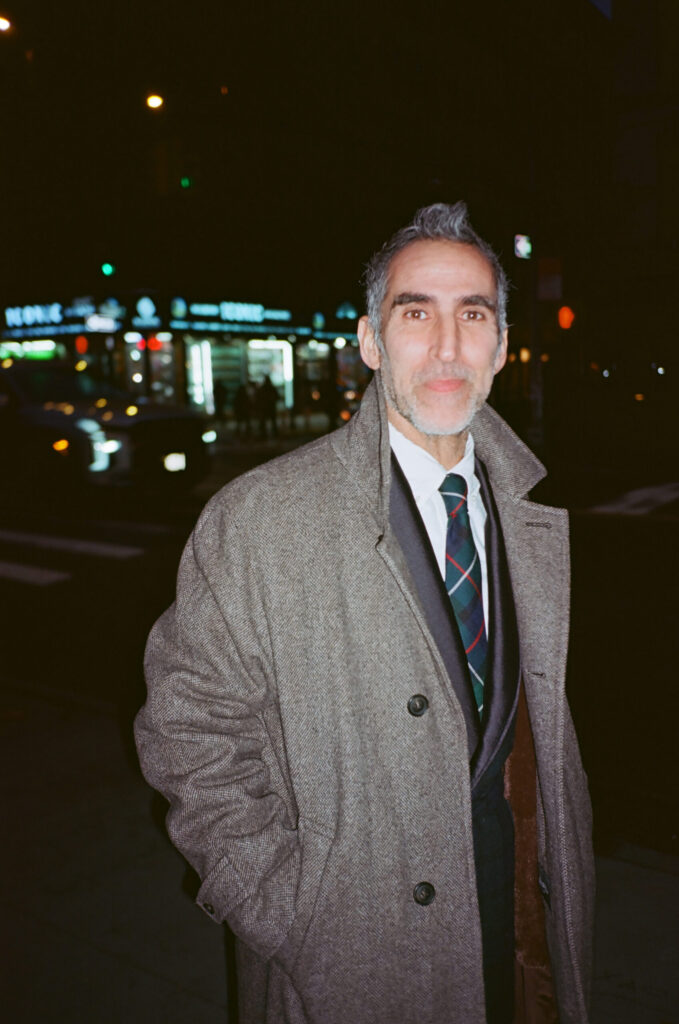Brendon Babenzien, photographed by Johnny Knapp.
“It’s The Cure!” exclaims Brendon Babenzien when asked about the second collaboration between his nautical-inspired menswear label Noah and the cult British rock band. “So if I get a chance to do it again, I’m going to.” Having served as the creative director of J. Crew since 2021, following an 18 year stint at Supreme, Babenzein is no stranger to integrating his cultural obsessions into his clothing designs. Crediting his expansive musical eduction to 70s skate culture in Long Island, Noah has put out a sequence of collabs with icons from Roxy Music to Earth Wind and Fire. “We don’t try to get too weird with it,” Babenzien explains. “We want to take those opportunities to do what we as fans we would want.” The first Noah x The Cure drop in 2017 got a stamp of approval from Robert Smith himself; when talks of a sequel kicked off, Babenzien was tickled to receive an enthusiastic “yes” from the Smith a second time around. “I’m not going to cry in front of you, but I could,” he tells Yasi Salek, the music zealot and host of Bandsplain, a one-of-a-kind podcast that digs deep into cult music history (and which Interview’s own Mel Ottenberg recently joined for a four-hour episode on Blondie). Over Zoom last week, Babenzien and Salek geeked out over their favorite bands and tried to figure out why music hits harder than any other art form.
———
YASI SALEK: So this is my fucking interview? I thought this was a pre-call, but we’re just fucking doing it. Let’s go.
BRENDON BABENZIEN: We’re going straight in. I have to say, before we get started, I didn’t know about your podcast. I’m old, so I’ve only listened to 10 podcasts in my whole life. And when these guys brought it up, I was like, “Oh, I don’t really listen to podcasts.” I’ve gotten through the first half and…
SALEK: I know. “I don’t have all day, bitch.”
BABENZIEN: Honestly, it’s so fucking good. I’m so thrilled to have met you because I don’t go deep on these things. I love bands, I love music and I just let it wash over me. I’m more on the emotional side. I connect and don’t really go to the intellectual. But I’m glad that I listen now because there’s so much cool information in there and it allowed me to, in a good way, regress.
SALEK: Totally. I’m a professional teenager. That’s what I always say.
BABENZIEN: I love it because I don’t get to do that anymore. You said something like, “Oh, what it must’ve been like to hear Close To Me when it came out the first time!” I was there for that. Now I’m going to go back and listen to The Smiths episode.
SALEK: That’s so kind of you to say and it’s so awesome that you listened. You’re not too old because my target demo is Gen X men. I don’t know if you fall into that category, but-
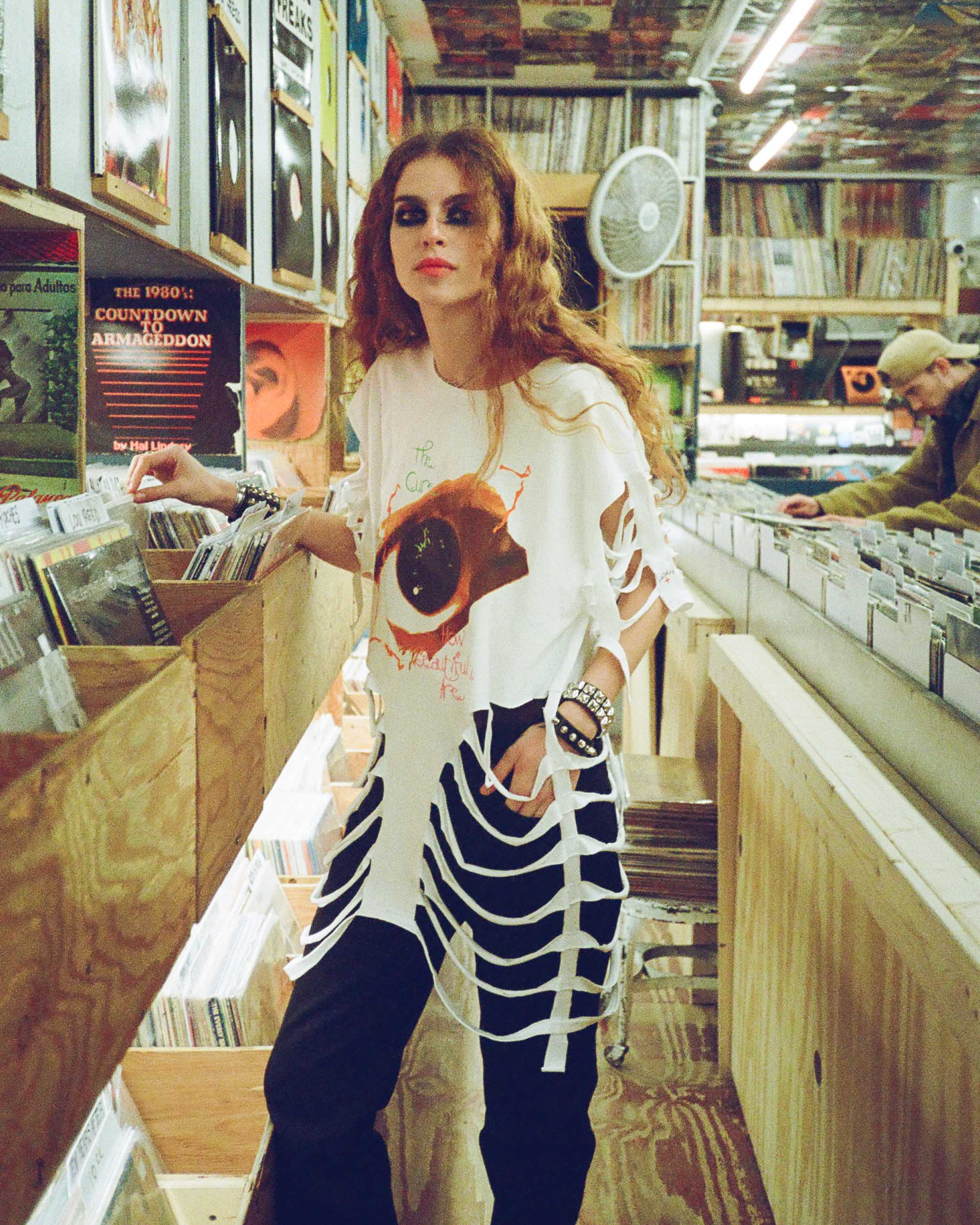
BABENZIEN: I absolutely do. I was born in ’71.
SALEK: Let me ask you a question. What do you think is further from God’s light: being a podcaster or making a streetwear brand? Is it neck and neck?
BABENZIEN: It’s pretty close. Thankfully, what we do over here, we don’t think of it as streetwear, even though that was my launching pad. They’re both pretty bad actually. They don’t contribute a lot. Actually, I don’t know about that because you made me feel great.
SALEK: I like to think we both elevate the form.
BABENZIEN: I think we try to push it forward, we try to change the rep.
SALEK: You mentioned you really love music and you guys actually sent me the Red Hot Chili Peppers collaboration. I, being an absolutely terrible influencer, never posted it or anything, but I appreciate the box.
BABENZIEN: Much to my team’s dismay! No, I don’t care. I’ve grown up in this space of skateboarding, surfing, music, and those things are so important to me that I struggle with the business side and all the things. I don’t like doing. So when we send stuff to people, I’m like, “I don’t care, you’re the right person for it. I want you to have it.” We’ve done loads of music collaborations and we’ll continue to, because for me it’s the art form that gets to the heart the quickest. You hear something and it’s instant.
SALEK: You know what I read? I’m going to sound like such a fucking asshole. I was reading a Kierkegaard book. It was clearly an older book, because it was before the advent of film, but he was talking about how music is one of the hardest hitting art forms because it’s experienced temporally. Before film, you didn’t experience art within a time.
BABENZIEN: Yeah. Even if I’m reading something sad I don’t find myself actually getting that emotional. With music I can get emotional and really fast, you know what I mean?
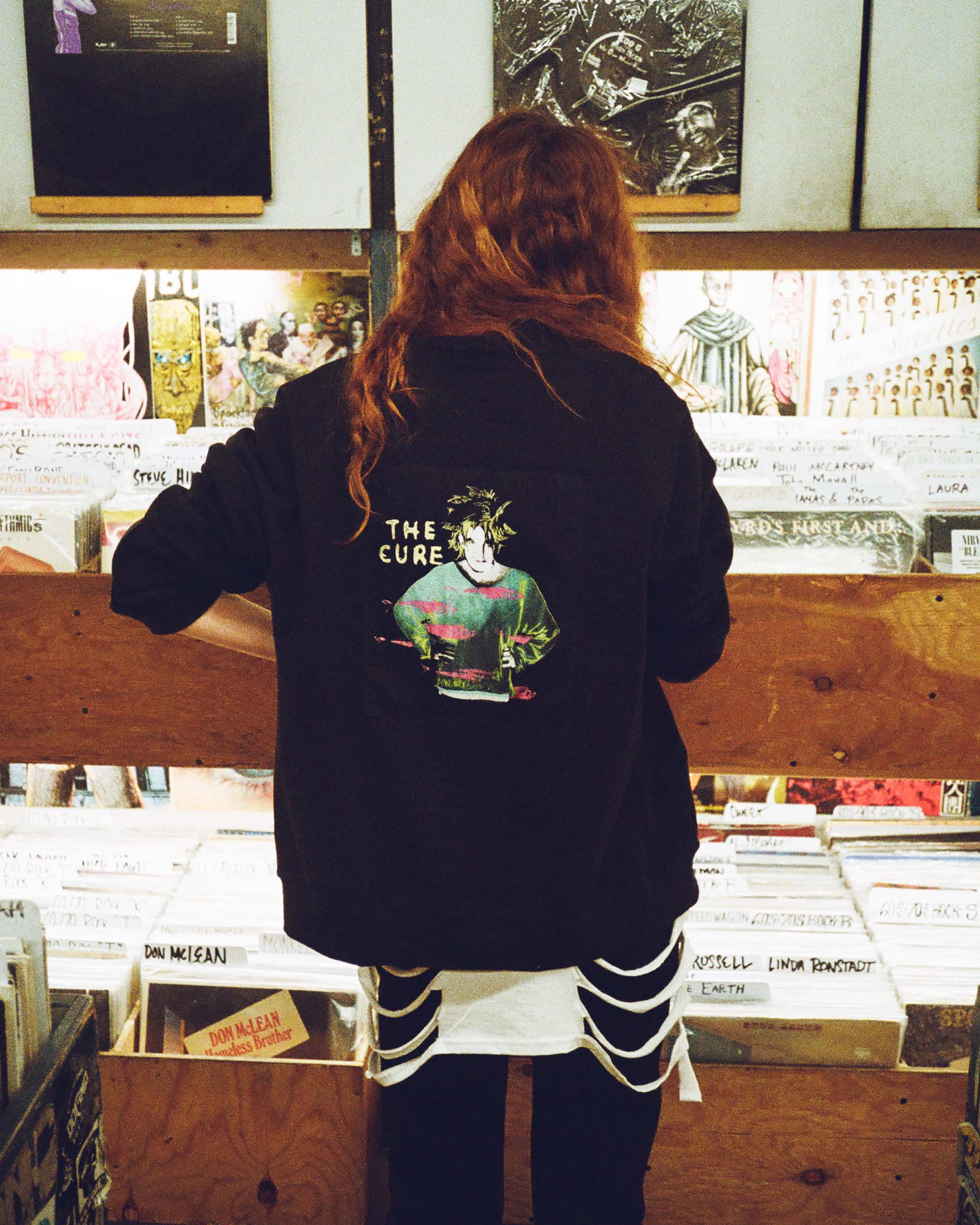
SALEK: Sure. I think it percolates on a different level and it maybe takes a little more time to digest, whereas music is visceral.
BABENZIEN: It’s totally instant. It’s always been there for me. Everything I do is connected. When I’m skateboarding, I’m listening to music. When I’m working, I’m listening to music. I used to put on music to go to bed when I was a single person.
SALEK: So you grew up in skate culture. Were you exposed to music through that? Skate videos were a huge place of discovery for me.
BABENZIEN: Yeah. I’m a little bit older than you, which means I go back to the first skate videos like Bones Brigade. I started skating in the seventies. I grew up in a really lucky window of time. The late seventies was punk, post-punk, New Wave, and then even the introduction of hip-hop. High school through college was an insane window of time. We had a radio station at the time on Long Island called WLIR. What they were doing was going to England and buying the records so they could play them whenever they wanted. They didn’t have to adhere to the labels’ release dates for the records. They even played Madonna before anyone else. They played The Cure, The Smiths, R.E.M., XTC, New Order. From that point forward, if you saw somebody with a WLIR bumper sticker on their skateboard, you were like, “Oh, that’s my people.” That’s where The Cure resided. I remember the first time I heard them, I was 13 or something.
SALEK: What song was it that you first heard?
BABENZIEN: It was “Jumping Someone Else’s Train.” Up until that point, my favorite band had been INXS. My brother and his friends were big INXS guys. But from that moment on, it was The Cure.
SALEK: You’re like, “Friendship with INXS ended. My new best friend is The Cure.”
BABENZIEN: Yeah. I still loved INXS. Still went to every show until Michael [Hutchence] passed, but it wasn’t hitting on the same emotional level.
SALEK: You’ve said so many things that are hitting the dopamine part of my brain. I got into a weird conversation last night with some billionaire music industry guy in Diplo’s hotel room. It’s a whole thing, we won’t get into it. But he was like, “I think we should be able to sell lyrics of songs, I think people should be able to own them. Isn’t that an amazing idea?” And I was like, “No.” Not to get on my high horse of hippie-ism or whatever, but I was like, “Wow, you are not one of us because if you were, you would understand that music is experienced, it’s emotional. You don’t need to own it. That’s the beauty of it.”
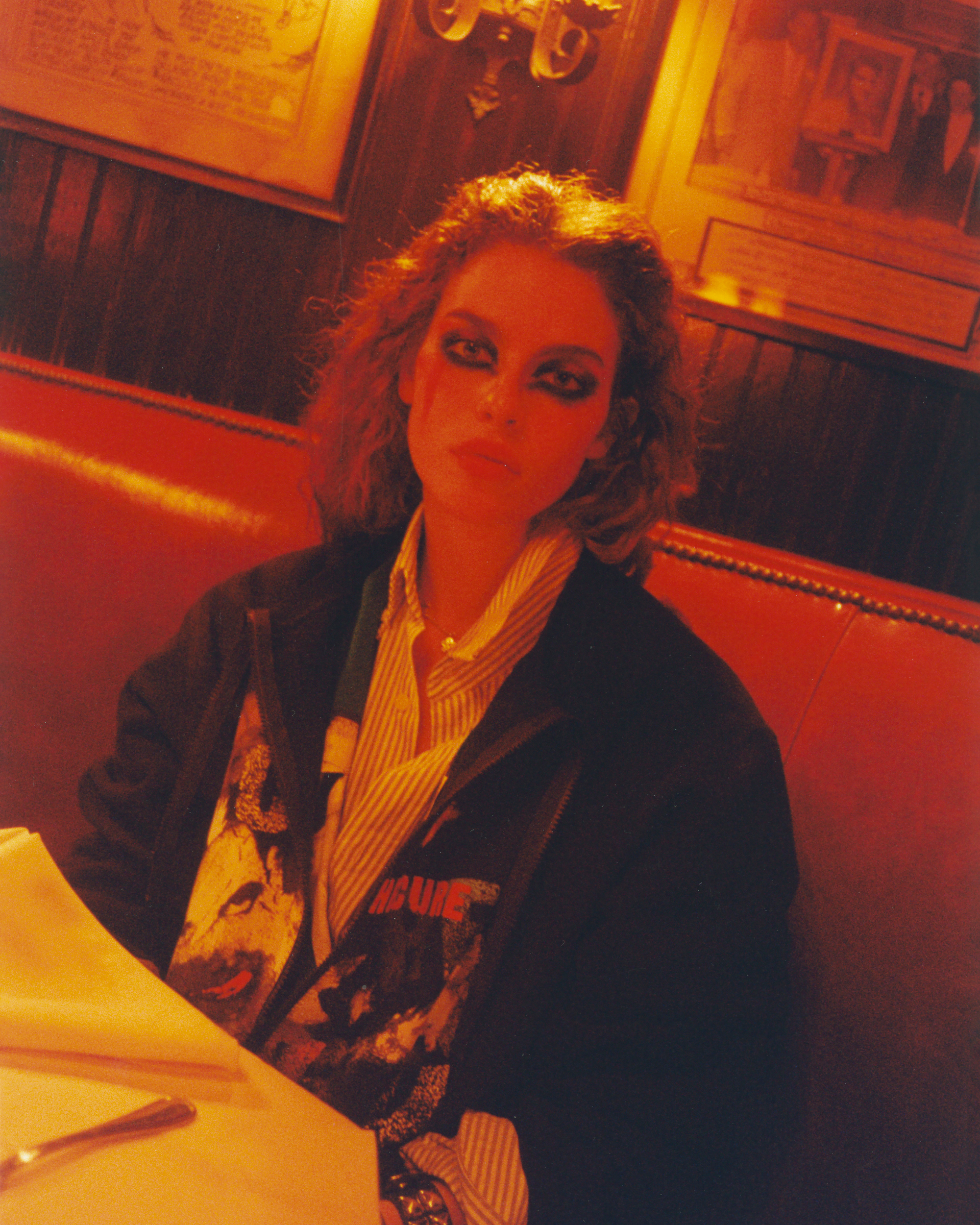
BABENZIEN: Music industry people historically have been always looking for another way to make money with it.
SALEK: “I know how we can make a fortune. We’re going to sell this lyric from The Fray, ‘How to Save a Life.’” Let me ask you, this is the second time you’re doing a collaboration with The Cure, so this really is your favorite band. What stones were unturned that made you feel like, “I need to do this again?”
BABENZIEN: The first time we did it, we were this tiny company. There was almost no reach and we couldn’t really do that much with it. We’re a little bit bigger now, so we can do more. And it’s The Cure. So if I get a chance to do it again, I’m going to do it. From what I understand, sometimes the artists aren’t even involved at all. You’re talking to a licensing organization or whatever. But in this case, Robert [Smith] actually liked the first one we did. A mutual friend that we have asked me, “Hey, would you be interested in doing The Cure again?” I was like, “Yes, do you think Robert will want to do it again?” When he hit him up, he said, “Yes,” enthusiastically.
SALEK: You died.
BABENZIEN: I’m not going to cry in front of you, but I could.
SALEK: Teenage you absolutely passed away at that moment.
BABENZIEN: When we hang up, I’ll go to the bathroom for a few minutes and weep a bit. So I’m told he really likes it and he wanted a bunch of stuff to give to his friends and family. Oftentimes, merchandise for bands is hit or miss. Sometimes it’s really good and sometimes, it’s not. What we do is, we don’t try to get too weird with it. We just try to make it good for somebody who likes The Cure. We want to take those opportunities to do what as fans we would want. And as you know, some of the really good stuff from back in the day is also really expensive. The T-shirt from us is like $48, so it’s really approachable. And it’s been blessed, right? It’s legit.
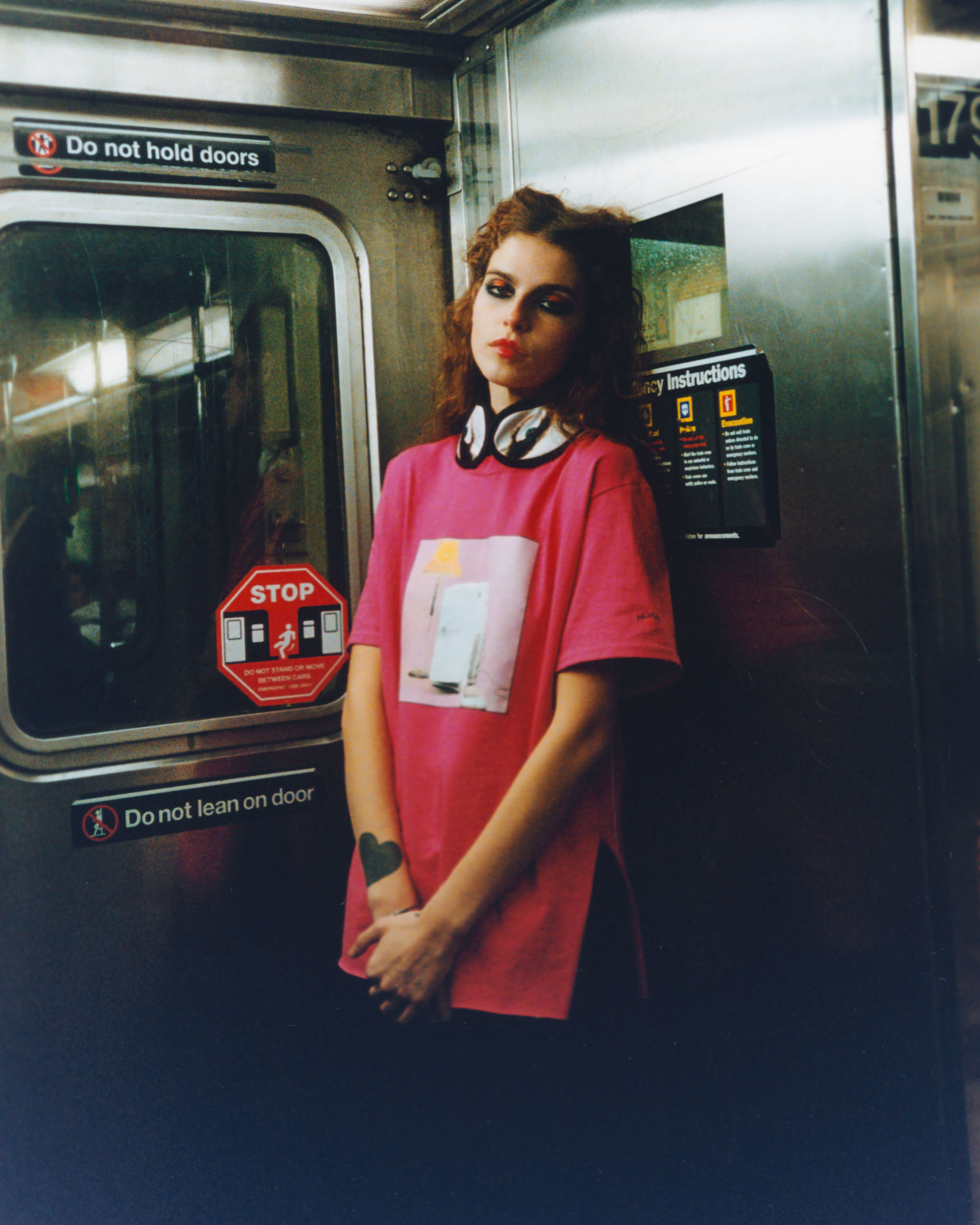
SALEK: Anointed, yeah. I think people don’t know this, but Robert Smith manages The Cure because they’re at a stage of a band where they don’t have to fucking do anything. They are the status of legend, icon forever. Robert Smith is just a singular artist who just had a vision from fucking 14 or 15 years old and executed it all the way through. I extra love the information that he didn’t want Mary [Poole] involved because, to me, that’s one of the most meaningful parts of the art and the story of The Cure, is that this man and this woman have been together since they were 14, 15 years old and still are to this day.
BABENZIEN: It’s fascinating.
SALEK: There’s no information about her. She’s just a mystery wrapped in an enigma wrapped in a shroud. She didn’t want to be out there and she wasn’t. I have two favorite Robert Smith interview moments. One is from the Rock & Roll Hall of Fame where he’s on the red carpet with that woman who’s like, “Are you as excited as I am for tonight?” And he goes, “Evidently not.” He’s one of the funniest fucking people. Then, when I was researching that podcast, I read this interview where he was talking about Joy Division and Ian Curtis passing away. They had played very early on with Joy Division and Lol Tolhurst gave an interview later after Ian Curtis died being like, “Yeah, it was really tough. I could really see there was a darkness in him and I’m not really surprised by this information, but it’s so sad.” I asked Robert Smith and he was like, “We literally never met them, we were in the green room the whole time.” I was laughing out loud in my bed for 30 minutes.
BABENZIEN: Yeah, you guys have covered fairly extensively the abuse of Lol. I think of Lol really positively.
SALEK: He was one of the most important parts of the band, and we say that, too. There would be no Cure without Lol Tolhurst. He served a super important purpose. Well, I’m sure we could geek out about The Cure for many more hours but you’re a busy man with lots to do.
BABENZIEN: I want to congratulate you on finding this perfect niche in life. For someone who loves music, you’ve really done something incredible. I appreciate you doing this.
SALEK: Thank you for having me. I’m honored. I love The Cure!
